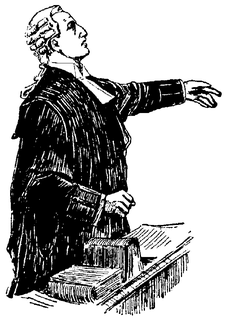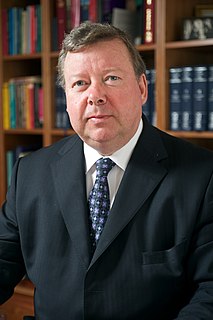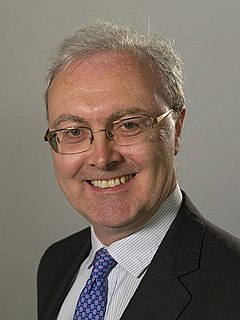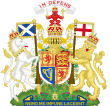History
The Faculty has existed since 1532 when the College of Justice was set up by Act of the Parliament of Scotland, but its origins are believed to predate that event. No curriculum of study, residence or professional training was, until 1856, required on entering this profession, but the faculty always had the power of rejecting any candidate for admission. Subsequently candidates underwent two private examinations; one in general scholarship that could be substituted by evidence of an equivalent university degree, and the other, at the interval of a year, in Roman, private international and Scots law, along with evidence of having attended approved classes. [1] For a long period the Faculty resisted reorganisation, until changes in admissions were introduced in 1960. [2]
The first woman to be admitted to the faculty was Margaret Kidd in July 1923, who remained Scotland's only female advocate until 1948. [3] Kidd served as Keeper of the Advocates' Library 1956–1969. In 2004 the first female vice-dean of the faculty was elected. [4]
Organisation and governance
The Faculty is led by the Dean of Faculty, who is elected by the whole membership. The post is currently held by Roddy Dunlop KC, [5] who succeeded Gordon Jackson in July 2020. He is supported by the Vice-Dean, Treasurer, Clerk, Keeper of the Library and Chairman of Faculty Services Ltd, all of whom are also elected. The Dean regularly consults with Faculty Council, which is made up of elected and ex officio members.
The Faculty is self-regulating, but subject to the overriding supervision of the Lord President of the Court of Session, who delegates to it the task of preparing Intrants for admission as advocates. This task involves a process of examination and practical instruction known as devilling, during which intrants benefit from intensive structured training in the special skills of advocacy. No-one can be presented to the court as suitable to be a practising advocate without satisfying these training requirements. The Faculty also provides for its members an ongoing programme of talks, seminars and conferences covering a wide range of topics.
Free Legal Services Unit
Many Advocates and trainee advocates carry out work for the Free Legal Services Unit (FLSU). This is part of the Faculty's long standing commitment to providing access to justice for everyone in society. The FLSU enables qualified persons to provide advice and representation to clients of accredited advice agencies (including CAS) across Scotland. (In order to devil a person has to first undergo a period of training in a solicitor's office.)

A barrister is a type of lawyer in common law jurisdictions. Barristers mostly specialise in courtroom advocacy and litigation. Their tasks include taking cases in superior courts and tribunals, drafting legal pleadings, researching the philosophy, hypothesis and history of law, and giving expert legal opinions.

An advocate is a professional in the field of law. Different countries' legal systems use the term with somewhat differing meanings. The broad equivalent in many English law–based jurisdictions could be a barrister or a solicitor. However, in Scottish, Manx Law, South African, Italian, French, Spanish, Portuguese, Scandinavian, Polish, Israeli, South Asian and South American jurisdictions, "Advocate" indicates a lawyer of superior classification.

In the United Kingdom and in some Commonwealth countries, a King's Counsel during the reign of a king, or Queen's Counsel during the reign of a queen, is a lawyer who is typically a senior trial lawyer. Technically, they are appointed by the monarch of the country to be one of 'His [Her] Majesty's Counsel learned in the law'. The position originated in England. Some Commonwealth countries have either abolished the position, or renamed it so as to remove monarchical connotations, for example, 'Senior counsel' or 'Senior Advocate'.
The call to the bar is a legal term of art in most common law jurisdictions where persons must be qualified to be allowed to argue in court on behalf of another party and are then said to have been "called to the bar" or to have received "call to the bar". "The bar" is now used as a collective noun for barristers, but literally referred to the wooden barrier in old courtrooms, which separated the often crowded public area at the rear from the space near the judges reserved for those having business with the court. Barristers would sit or stand immediately behind it, facing the judge, and could use it as a table for their briefs.

The title of Senior Counsel or State Counsel is given to a senior lawyer in some countries that were formerly part of the British Empire. "Senior Counsel" is used in current or former Commonwealth countries or jurisdictions that have chosen to change the title "King's Counsel" to a name without monarchical connotations, usually related to the British monarch that is no longer head of state, such that reference to the King is no longer appropriate. Examples of jurisdictions which have made the change because of the latter reason include Mauritius, Zambia, India, Hong Kong, Ireland, South Africa, Kenya, Malawi, Singapore, Guyana and Trinidad and Tobago. Jurisdictions which have retained the monarch as head of state, but have nonetheless opted for the new title include some states and territories of Australia, as well as Belize.

William Gordon Jackson KC is a senior Scottish lawyer who served as Dean of the Faculty of Advocates from 2016 until 2020. From 1999 to 2007 he was a Scottish Labour Party Member of the Scottish Parliament (MSP) for Glasgow Govan.

Arthur Henderson Briggs "Andrew" Constable, Lord Constable was a Scottish advocate, judge and Conservative politician. He served as Dean of Faculty and as Solicitor General.

Richard Sanderson Keen, Baron Keen of Elie KC PC is a British lawyer and Conservative Party politician. He was Advocate General for Scotland from May 2015 until his resignation on 16 September 2020.
An admission to practice law is acquired when a lawyer receives a license to practice law. In jurisdictions with two types of lawyer, as with barristers and solicitors, barristers must gain admission to the bar whereas for solicitors there are distinct practising certificates.
Dame Margaret Henderson Kidd, Mrs MacDonald was a Scottish legal advocate, editor and politician. She was the first woman to become a member of the Faculty of Advocates, the first woman advocate to appear before the House of Lords and before a parliamentary select committee and in 1948, the first British woman King's counsel.

Stephen Errol Woolman, Lord Woolman,, is a Scottish legal academic, and a Senator of the College of Justice, a judge of the country's Supreme Courts.
John Francis Wheatley, Lord Wheatley, is a Scottish lawyer and retired Senator of the College of Justice, a judge of the Supreme Courts of Scotland, sitting in the High Court of Justiciary and the Inner House of the Court of Session. He is an authority on road traffic law. His father, John Wheatley, Baron Wheatley, was Lord Justice Clerk between 1972 and 1985, the second-most senior judge in Scotland.

Colin John MacLean Sutherland, Lord Carloway, is a Scottish advocate and judge who has served as the Lord President of the Court of Session and Lord Justice General since 2015. He was previously Lord Justice Clerk from 2012 to 2015 and has been a Senator of the College of Justice since 2000.

The University of Aberdeen School of Law is the law school of University of Aberdeen, located in Aberdeen, Scotland. Established in 1495, it has been consistently ranked among the top 10 law schools in the United Kingdom.

Valerie Elizabeth Stacey, Lady Stacey is a Scottish lawyer, and a Senator of the College of Justice, a judge of the country's Supreme Courts. She was the first woman ever elected Vice-Dean of the Faculty of Advocates.
The Society of Advocates in Aberdeen is an independent non-regulatory professional body of solicitors in the northern Scottish city of Aberdeen and its surrounding area. It is a membership organisation providing a library, continuing professional development (CPD) courses and social events for its members, as well as engaging in representative activities, similar in form to the Society of Writers to Her Majesty's Signet in Edinburgh and the Royal Faculty of Procurators in Glasgow. The Society has its base in the Advocates Hall, located on Concert Court behind the Sheriff Court.

George Gordon Stott, Lord Stott, PC, QC was a Scottish advocate, sheriff and Lord Advocate, the chief legal officer for the Crown and government in Scotland. In retirement Gordon Stott published three volumes of extracts from the diaries he had been keeping throughout his legal career.

Walter James WolffeFSAScotFRIAS is a Scottish advocate who served as Lord Advocate from 2016 to 2021. He previously served as Dean of the Faculty of Advocates from 2014 to 2016, and Vice-Dean of the Faculty of Advocates from 2013 to 2014.
The Honourable Lord Summers. Alan Summers KC is a Scottish lawyer.
James Gordon McIntyre, Lord Sorn, (1896–1983) was a Scottish law lord who served as a Senator of the College of Justice. He was also a decorated war hero from the First World War. He was generally known by his middle name, Gordon.














